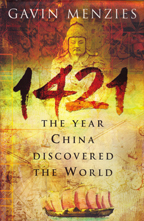Annex 19 – Evidence of Chinese Fleets visit to Spice Islands/ Philippines/ Indonesia
1. Maps
Further research research
2. Chinese Records and Claims
· Fei Xin’s poems – Chinese fleet reached Sulu.
· Diaries of Master Bentou (Zheng He’s navigator) who is buried at Sulu. (Kherson Huang)
· Tai Cang Zheng He Research Institute Director, Nin Dian Nian, published article, “Zheng He reached Philippines”.
3. Accounts of contemporary European historians and explorers
Further research needed
4. Accounts of Local People
Philippines village of Bolinao, on the most western point of the Gulf of Lingayen. Local legends tell of what was called a large Chinese ‘colony’ based close to San Fernando. The story had been passed down through many generations. The general drift that a reader interpreted was of a Chinese colony whose ‘fleet’ had been blocked-in by other ships within the enclosing reef. The Chinese took their ships “… up a river for safety to escape being destroyed…” by the blockade. Our source told how the Chinese had dug a channel inland (over a considerable period of time) and around the enclosing ‘foreigners’ offshore. The Chinese fleet and its whole ‘colony’ thus escaped in their ships. This must have taken a massive workforce to dig an escape canal of some considerable distance to accommodate ocean-going sailing junks and, I presume, there must still be some evidence of this canal. Mention was also made that the Chinese junks were ‘very large’ – (John Chetwynd-Chatwin).
5. Linguistics
Further research needed
6. Shipwrecks
· The Pandanan junk: hull wood dated 1410 (Dr Dizon’s evidence at Royal Geographical Society 15 March 2002)
· An archaeological dig 100 miles inland on a Thai river. Here they found a teak anchor with a shank of 20 feet and the flukes at eight feet. It was buried in mud and thus preserved to a high standard – this might have come from one of the larger junks – Mike Boss
·The King of Brunei sent diplomatic missions to China from 1405 to 1425 and trade links between the two countries had a very long standing. In 1998 a very big Chinese trade vessel was excavated and its 500 ton cargo was recovered, much of which was deposited in the national museum in Brunei. The goods came from approximately the same date as the 1421 expedition. (Richard Harbord)
7. Chinese Porcelain and Ceramics
· Zhu Di (1403-24) blue and white porcelain found aboard (Dr Dizon)
8. Pre-Columbian Chinese Jade found in the wake of the Chinese Fleet
Further research needed
9. Artefacts, gems, votive offerings and funerary urns
· Zhu Di coins aboard (Dr Dizon)
· In hold were metates from S. America (Dr Dizon)
10. Stone: buildings, observation platforms and carved markers
Further research needed
11. Mining Operations found by the Europeans when they reached the New World
Further research needed
12. Advanced Technologies found by first Europeans on their arrival
Further research needed
13. Plants found indigenous to another continent
Further research needed
14. Animals found indigenous to another continent
Further research needed
15. Art
Further research needed
16. Chinese customs, games, clothes and legends
Further research needed
17. Armour, metal weapons, cannons and implements found
Further research needed
18. Diseases
· Tokelau (para 25) (Fonseca).
19. DNA
Further research needed
20. Meteorological events and weather
Further research needed
21. Stars and Navigation
Further research needed


